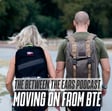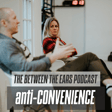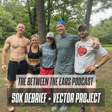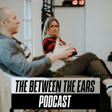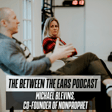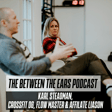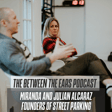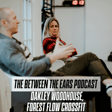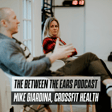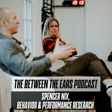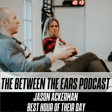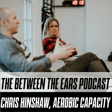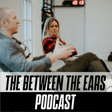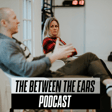Become a Creator today!Start creating today - Share your story with the world!
Start for free
00:00:00
00:00:01

Catching Up
K and I kick off this brand new season (joke) catching up about what we've been up to, some big changes to life, thoughts on the physical/mental training space, and a look ahead for BTE.
Support the showTranscript
Introduction and Catch-Up
00:00:01
Speaker
Hello. Hello. It's been a while. Yeah. It's been like a while, a while. Season 10. Season 10. We'll have the record for the shortest and most seasons. Yes. So far we're doing well with that at least. It's all about how you frame it really. Yeah. Today's a, today's a catch up episode.
00:00:31
Speaker
Yeah, kind of a, what have we been up to slash discussion slash everything? What? We can't be slash everything.
Recording Plans and Busy Schedules
00:00:46
Speaker
Why have we been what? Basically, why have we not been recording podcast episodes? Yeah. There's something about
00:00:56
Speaker
fighting to stay afloat. Yeah. Well, we do have a plan of having more guests on. So then there was that delay, and then we kind of just fell off. But since, I don't even know when we did our last one, but we have... The four by four by four. Okay. So not that long ago, but since then, we've had a little bit of a slowdown, which is nice. Yeah.
00:01:24
Speaker
For those who don't know, it's been an aggressive, well, I would say 16 months, but it may be longer because of we kind of rolled from the pandemic into you going to school and kind of that whole thing. So it's kind of the first time we've been able to just sort of take things a little bit slower.
00:01:49
Speaker
Yeah, although it doesn't really... Yeah, I mean, I guess it's a little slower, but it's just not that much. Yes, we were walking the dogs on like a Thursday feeling kind of bad that it's Thursday and it felt like Saturday. So it's been a little slower, which is nice. Yeah, which has been necessary. Yeah. It's funny because we were here a year and a half ago talking about
Career Shift to Therapy
00:02:16
Speaker
starting school? Well, yeah, like the decision, like the decision to go back because we, you know, have been in the mental health coaching fitness realm for a while and then obviously elevated with opening up between the ears, fitness. And then it was kind of like, but the mental health component. Right. And also with clients,
00:02:45
Speaker
also in a pandemic, all of this, all of these things. And I was like, fuck it, go back, do the counseling therapy thing, be able to officially and professionally and ethically step into that role. And then since then, that's basically been a major
00:03:10
Speaker
you know, that's been a major thing. Full classes, 30 hours a week working at a part-time, full-time job and then this and then life and all of that. So. Yeah. So now you are done school, you have your degree, then you have to, you still have to get hours and such and such. Like there's some kind of continuation of that, but what are you, now that you do have that credentialing, have things changed?
00:03:39
Speaker
is kind of what's next. Well, things have changed for sure in the sense that
00:03:48
Speaker
there's the time and a place for fitness coaching and talking about, you know, some deeper things. And there's a time and a place to shut the door, not move and dive into other deeper things. And I think that's one of the things that drove me to really wanting to have the ability
00:04:17
Speaker
also legally and not just the enthusiast who reads a bunch of shit on Instagram to be able to provide more clinical services. There's a time for clinical stuff and there's a time for coaching and surface level stuff. Do you think right now there are like, is that something that
Credentials and Training in Therapy
00:04:40
Speaker
I don't want to say bothers you, but you're aware of when you see, I mean, cause there are a lot of people, especially in Instagram world kind of playing therapy role, mental, physical, emotional fitness, using that phrase, like, but obviously they don't have the credentialing. Like, so what, what do you think about that? Well, I think that you don't have to, I don't think the credential is a definitive, Oh, now you know, kind of a thing.
00:05:11
Speaker
But I think you learn a tremendous amount by going, in my case, the social worker route and doing therapy with real human beings, not in a fitness standpoint. Like, you know, because you, you get that, like that's removed.
00:05:35
Speaker
But what do you think you personally, what do you think these 16 months helped you other than the piece of paper? What do you do learn? I mean, I learned how to better interact with people on a clinical level.
Emotional Fitness vs. Physical Fitness
00:05:53
Speaker
of a wider range of person, the person who comes into the gym, the person who, you know, generally speaking is, has full faculties has, you know, the ability to go to the gym and do all of that stuff. You know, they're, they're gonna present with like,
00:06:15
Speaker
one type of, not one type, but like they're going to present in a manner in a training session that is completely different than when they come in, in their genes, you know, off hours and there's no workout. So really like the exposure to working with humans on the physical, mental, emotional, social level,
00:06:46
Speaker
was blown wide open because it was outside of the walls of the gym. Can you do a lot of that stuff inside the walls of the gym? You can do some stuff. Well, the problem though is, as we've said in many things, not just mental health, because that's like more of an extreme, but even like
00:07:04
Speaker
We're not doing rocket science in our gym, but even the concept of what we do here is so different from what people expect that then if you throw mental health in there, it's like, well that's, we don't even really touch that when we talk to people about like, oh, what do you do there? Because it's not therapy. It's not, it's like impacting someone's mental health by partnering with their system.
00:07:32
Speaker
Well, and that's, and I think the value is that it is, it is something that you're planting seeds, you're, you know, watering the soil, you're putting in the sun, you know, and the thing that's one of the other things that I learned also is how, you know, just from like a clinician standpoint, some best practices, for sure, there's like theories and there's this and there's that.
00:07:59
Speaker
But, you know, there are certain things that the, I think unfortunately what I've seen is speaking of terms and talking about concepts and trying to do work that sounds cool.
00:08:17
Speaker
but you're, but people are not fully appreciating the depth and the expansiveness of the human out truly outside of the gym. You know, it's like, Oh, we're going to work on emotional expression inside of the gym. This is an example. So for example, for someone says working on, Hey, I want to work on expressing myself more emotionally inside of the gym. Okay, cool. But like,
00:08:44
Speaker
Unlike your business meetings or your social agendas, scheduling an emotional expression or confining it to movement only misses your life outside of the gym. You're saying it's fabricated.
00:09:12
Speaker
doesn't really work that way. Right. Right. Could you say that when you work out,
00:09:19
Speaker
you want to be a little more aware of your emotional state so that that can guide you. Of course. Right. But you're saying the difference of like, I want to like work on, I want to like express some of my anger, like I want to work on my anger management or kind of almost to what's the word I'm looking for? Um, not fabricated, but contrived. Yeah. Right. Yeah. Cause the body you're saying just like the system just doesn't work like that. So you're sort of,
00:09:51
Speaker
Yeah. And so if you're angry one day, then it might be the day to work through that. But it's a tricky thing because if you're saying, I want to use the gym as the place to work on my emotional state, it also tries to control something that is
Exercise as a Coping Mechanism
00:10:20
Speaker
much more subject to being controlled by outside influences. Yes, however, interesting you say that. I recently read on someone's Instagram something about, and I think this is not one person, but there's a thing out there that like, yes, doing
00:10:44
Speaker
fill in the blank type of exercise. Let's just say if we said come to between the ears because it'll help you work on like controlling what you can control, like as you can control your how you are, not the rest of the world. Now,
00:11:01
Speaker
Like what do you think about that? So you're saying like come to the gym because the gym is going to now be a place, your fitness to what you just said is a place where you can work on like controlling your emotions, expressing emotions so that when you leave here, because like you might not have control over anything else in your life, but you can control that. I think it, I think it misses the point. Right. Well, because it's also,
00:11:27
Speaker
I feel like it's tough because there are for sure physical things we've both done where it's challenging and you take that with you and for sure it impacts things in your life. But saying every time you come to train, every time you move, it's this
00:11:51
Speaker
this almost like guarantee that then you can like go and deal with whatever is going to come your way that day. I think they're just two different things and you're almost getting a false sense of something and it's kind of also not a healthy situation with what you're doing to your relationship with fitness because it's always going to be this like
00:12:13
Speaker
big thing and sometimes, like that's not true. Well, this is where I have, okay, so this is really kind of one of the things that I think is the problem with that. And I think everybody, I don't think anybody has malicious intent. I'll just start with that. Sure. I just don't think, I think a lot of this stuff sounds good. But words do matter and if that's what you're saying, it's kind of a good thing. And it's like, okay, so when it comes to that,
00:12:43
Speaker
And I do believe in personal empowerment, personal responsibility, and the ability and the necessity to control what you can control, which is you. But there's also that component of the fact of the matter is emotions operate.
00:13:02
Speaker
and are influenced by things and systems and processes so far below your level of awareness and way fucking faster than you can conjure up a thought and come up with a course of action. And thank goodness for that.
00:13:19
Speaker
Now the awareness of your, of your reaction and the ability to then shift towards a response. Yeah, for sure. Like that's where training does stuff does happen. But when it's just throw, and again, and a lot of this, the problem is a lot of this comes from like social media and it's like a field of straw and one fucking approach or one line or one like little bumper sticker thing is a match. And that's what, and then that's what it is.
00:13:48
Speaker
and you just throw this match on this field of straw and now it's, oh yeah, control come in the gym so that you can control what happens outside your life. And it's like, what are you God? How do you do that? No. Now, can you feel more resilient? Can you form or cable? Can you get some stuff out? Can you have that? Yeah, of course. But boiling it down, talking about coming into the gym and moving in a manner that
00:14:19
Speaker
basically arms you to deal with your outside stressors. There's nothing wrong with that. That's a good thing. But what we're doing is also forming a coping mechanism. And that's okay. Everybody needs coping mechanisms. Coping mechanisms are not healing modalities. Healing modalities go to the source.
00:14:49
Speaker
healing modalities,
Coping vs. Healing in Fitness
00:14:50
Speaker
if you are, for example, if your marriage is the source of anger, resentment, whatever it might be, and you go to the gym as a coping mechanism because if you don't go to the gym,
00:15:15
Speaker
the negative environment of your marriage. You don't have any outlet. You don't have any outlet. It's like, and certainly not a job. So what a healing modality would be you and your husband going to therapy. Working on your fucking marriage. Yeah. Versus, no, I'm just going to deal with this. And I'm definitely not judging anyone or anything. No, but you're saying in an ideal world, we have both. You need healing modalities and you need, and ideally coping mechanisms that aren't unhealthy. Like going to the gym, more healthy than going and getting
00:15:44
Speaker
and every night, obviously. Yes. Right. When, though, to your point with, okay, now we're talking about fitness and health and longevity and consistency and sustainability, if that is then the environment in which you are growing your fitness plan,
00:16:07
Speaker
I think it's just limiting. Like the pot, you're putting it in. If your fitness experience is really only a coping mechanism, you're going to be limited with your fitness because it's really got a different job. Not necessarily to get you fit, be healthy and focus on longevity, but more so because it's a coping mechanism. Right. And so it's like a, it's like a way to stop the bleeding. It's a true job. And so this stuff, like all of this, what I think is interesting, you know, you hate that word.
00:16:35
Speaker
But it is interesting because this is sort of, and okay, maybe you didn't learn this in these 16 months, but I would argue that it was an immersive 16 months of constant awareness, learning, exposure to mental health. I was exposed to people who
00:16:57
Speaker
have been doing this for a long time, who teach it, who have lots of experience and was a student. Right. So I think that the value is in what I think we're, what we've always tried to do, but now more so, even more so with your experience is not having these absurd absolutes because there isn't a lot of it is once you scratch below the surface of the Instagram, whatever that little text block is,
00:17:27
Speaker
that person. And again, I don't think it's, there's like, bad intentions necessarily. But if you really don't have the knowledge to speak on some of that stuff, or understand, for example, coping mechanisms, or what's healthy, or what, or healing, whatever it is, it is, yeah, it's, it's, it can be dangerous territory to be out there making these claims. So
00:17:52
Speaker
Well, and the other thing with one of and well, there's two things. Yes, of course, we think I think and we think and have experienced that you can have an emotional expression through movement in the gym and great. I think it's a little it's it's it's it's becoming a little bougie trendy sort of like just again bumper sticker, where it's then controlled more so by the cognitive processing.
00:18:18
Speaker
versus the emotional side of- For example, like give an example for that. For example, saying like, I'm going to come into the gym and basically preemptively say what my emotion and my emotional expression is going to be in there. And like planting the idea in your mind- Versus coming in, warming up, kind of seeing where you're at, letting the- Yeah, or knowing coming in.
00:18:49
Speaker
I'm enraged right now. Well, yeah, most people... And what's funny about this is people will have it fit their narrative. It's very interesting that there's a lot more, I wanna get my anger out, I wanna... That side is much more common than someone coming in
00:19:13
Speaker
And I guess I'm talking about the gym and it being like I'm going to just give myself a break. I'm going to take it easy. I'm feeling this. Like then it's sort of like there's a whole other narrative that goes along with it, which I find, but, but again, it's like that balance, which I'm not trying to, but that is, we have been doing this for longer than it's really now becoming a trend, I think. And one of the things we have said and what we do do here,
00:19:43
Speaker
is have a balance because you do need both. And so not to pick on yoga, but there's a lot of that like safety being like in, and I've enjoyed that. Like I've enjoyed being on a map, being kind of in, going internally, kind of not having that, like, I don't want to say it's repression, but you're sort of backing away a little bit and being accepting.
00:20:09
Speaker
But only that all the time. No different than only just putting on heavy metal and fucking killing yourself in the sled all the time.
00:20:18
Speaker
you know, but that's where that dogma and we've talked about this before, but that kind of gets in the way, but to get back to sort of what you've learned. So obviously we're saying, as it relates to fitness, but where do you see your clinical? Like what, what are your, what are your hopes for like next year at this time in an ideal world? What does, what does Bill's life look like? Oh my God. I don't know. When we first met,
00:20:45
Speaker
You came to a goal setting, remember, with Lou Lemon? I do. And the assignment was like, okay, put your goals, like five-year goals, this and that. And she gave us a couple minutes and I had like, boom, boom, boom. I had this whole plan and like one, two, you're five-year. And I think Bill just had like a doodle. Like, okay, let's hear what you had to share. They asked like, where do you want to be in five years? And I just wrote, alive.
00:21:16
Speaker
I just remembered that. Well, you achieved that. Now what's next, Bill? I just want to float back to one other thing, though, about the coping mechanisms and where I see there being some weird stuff going on with emotions. Because the reality is a lot of people put up a lot of stuff on social media that has no context. It's just a grab.
00:21:45
Speaker
It's just a grab. Everything on a social media is. Yeah, including your attention, right? That's including us, right? Everybody. It's for attention. Yes. Otherwise it wouldn't exist. Correct. Attention then leads to whatever it might be. But there's a lot of shit floating around, a lot of stuff floating around. A lot of things that you might say in a clinical setting work on with someone in a clinical setting.
Trauma Work and Clinical Responsibility
00:22:15
Speaker
that can get up there. Forms of attachment, forms of attachment injury, insecure, avoidant, lots of stuff. So people see a lot of these things. If you were to put up a diagnosis from the DSM,
00:22:35
Speaker
every day, people would probably read through some of that stuff and be like, oh my God, I have that. And then the next thing, oh my God, I have that. Oh my God, I have that. And so the same thing goes for coaches who are trying to be clinicians, who are not in a clinical relationship. So much of the therapeutic relationship
00:23:04
Speaker
is based upon the client clinician relationship. And I think that's where you don't need necessarily a credential to elicit and partner with a client to have significant change. Anybody, you know, like, but there are things from a clinical standpoint that beyond just the like quick patch the wound type stuff needs to be considered. One of them being this whole notion of working with trauma.
00:23:33
Speaker
Yeah, well trauma is everywhere now. Trauma is everything. And one of the things that I had a major problem with throughout my program was how much people would comment on other people's trauma. And they would say things like, that was trauma, that's traumatizing for that person. And it's like, well, how do you know?
00:24:00
Speaker
You're that, how do you know? That's not your fucking trauma to a pine knot. You don't know what's the difference between trauma and significant adversity that propels somebody to do something. You know, that's like, it's like the way it goes here. There's a story there's in the city, this guy walks by this homeless person drunk on the street. Just not, not a good situation.
00:24:29
Speaker
The person goes to this other person, how'd you get here? And the drunk kind of homeless person without going nowhere and again, I'm not like being like mean, judgmental, but responds, my dad was an alcoholic. The guy goes, oh, yeah, okay. I'm sorry.
00:24:53
Speaker
the guy continues on, he goes into this high rise, goes up to the top floor to meet with a CEO of the building of the company. How'd you get here? My dad was an alcoholic. How'd you get here? He goes, my dad was an alcoholic. And so one of the problems with, you know, anyway, with trauma and stuff, it's not just hardship. It's not just fucking adversity. But you're saying in social media, throwing those terms around,
00:25:21
Speaker
Like in how, like how do you see it as we were really talking about coaches versus clinicians? You just think there's just not enough understanding and knowledge in clinical. Well, there's a couple of things. One, if you are doing trauma work with people and you just go straight for trauma and you don't check in, you don't establish rapport, you don't really get willingness and buy in. That's a big thing with exposure.
00:25:51
Speaker
therapy, there has to be... You have to basically want to do it versus forcing someone into it or tricking them into it, potentially be re-triggering. Anyway, if you don't check in with how somebody copes with something before doing trauma work, you're gonna maybe fuck them up and that's reckless.
00:26:20
Speaker
but you want to dive in and do trauma work or say, yeah, we heal trauma through movement or we do trauma informed fitness. That's great. That's awesome. That could be phenomenal because
00:26:36
Speaker
Sure. Yeah. It just does that person really know what the fuck they're doing. But now you're getting into something where it's like, this is, what is that person's, how does that person currently cope with their symptoms of, of trauma? How do they currently deal with it? Oh, I, you know, and if it's more along the lines of post-traumatic stress, it's like, yeah, they typically avoid or distract or, you know, these different things.
Exercise Research and Mental Health
00:27:07
Speaker
if you don't check in with that. Yeah. So that's what I'm saying. The negligence, the irresponsibility that's kind of out there. So that's kind of what I see. And that's some of the stuff with throwing up these, you know, terms that yet are great, but they're contained within a entire ecosystem of other stuff too. For example, how many people do trauma work in the gym with people?
00:27:37
Speaker
and have no idea about somebody's past experience with suicidal ideation or possible attempts. Where are they on that spectrum? Is it even, is it discussed? Is it talked about? Does somebody have a safety? Are there that many people doing trauma work in a gym that you like, do you see a lot of that? I mean, obviously we follow different accounts and so you see different things, but
00:28:03
Speaker
I see trauma and fitness getting used a lot and even other coaches or not even fitness coaches either, but people on the Instagram talking about the effects of trauma. There's a time and place for psychoeducation, of course, whatever, that's fine. But I guess the problem is you say something out there and
00:28:33
Speaker
The responsibility is that you're leaving it up for not only interpretation, but personification. So if somebody reads something, they go, oh, that's me now.
00:28:44
Speaker
Sure. Yeah. So I mean, it really, that's the, Instagram really isn't a place and, and sort of on the way into this podcast we were talking about. This is, it relates to fitness. Like I think there's surface things for mental health that are appropriate to be online or just general things like, Hey, get out and move, go for a walk in the morning, like be active. That's great.
00:29:12
Speaker
for fitness and mental health, actually. For fitness, maybe like, hey, join a gym, try to like, vary up what you're doing. Like, those are very general prescriptions. And that's appropriate for probably social media. But at this point now, it's like, it's more complicated than that. You know, fitness is, sorry, but
00:29:34
Speaker
beyond just getting people moving, it is more complicated than that. And as is mental health, it's not just a concept, it's not just a theory, it's- Well, there's so much also, there's so much more information now. And yet, you can find a research study to confirm anything you want.
00:29:58
Speaker
including, yes, we won't get into that. But I'm just saying like, so even the thing of like, exercise is good for my mental health. Okay, cool. What kind? Right. Oh, well, you know, no, I don't. What kind? Because what were they doing? Oh, they were doing, you know, zone two cardio, three times a week.
00:30:23
Speaker
Is that what you mean? Well, that's not what I mean. That's bullshit. That's not exercise. Okay. Well, but you know what I mean? And so it gets into this whole thing. But that's really full circle back to what we do here, that it does matter what you do with your body, how your body, you know, high intensity.
00:30:42
Speaker
zone two, all those things, they do have an impact on your system, which does have an impact on your mental health. So that's where it is more complicated. Now, someone that's been in bed every day for two weeks, does it really matter? I mean, yeah, I probably wouldn't throw them into a HIIT workout fucking day one, but for them, it's like walk. Yeah, I think that's kind of part of it also because one of the things I did do with clients
00:31:12
Speaker
in a clinical setting under the guise of therapy or under the umbrella of therapy was, I had quite a few handful say, yeah, I really, these are veterans. I want to get back into the gym. I want to start working out again. Yeah. Excellent. What are you doing now? Nothing. When was the last time you worked out? It's been years. Okay.
00:31:36
Speaker
Right. So now what? Because that's because again, like the the person who works out five times a week is driven eats fucking doesn't eat nonsense all the time, like is aware of their nutrition has a social, you know, sort of situation setting.
00:31:53
Speaker
knows how to do pretty much all of the movements. You're not that necessary as a coach. They could go in there. If you got locked out and they were in there and they were working out, the mechanics might not be great, but they could know their way around. That person is 99.9% versus the person who comes and says, not only is it difficult for me to go to the gym, it's difficult for me to
00:32:25
Speaker
do basic maintenance of life activities. Okay. And I think that that is what, like the, the, the gap, you know, now when, cause otherwise we're not talking about really, I don't think like mental health or mental fitness in, in, in, in somebody who says, I don't
00:32:50
Speaker
eat or clean myself or literally leave. Sure. We're talking about a totally different extreme. We're talking about a totally different extreme. However, the person who is coming in all the time and they're like, Hey, I want to work on my mental health or the gym is good for my own mental health. Yeah. But like there's a difference between, I think, optimizing and going more towards like mental performance. What you're really talking about is you don't want to drop the bar.
00:33:20
Speaker
on an unbroken set of, you know, cleans, or you want to be able to run faster, you want to be able to compete. And both of those are okay, you know what I mean? And I guess both of those require being aware of the conversation you're having with yourself and your environment, blah, blah, blah, blah, blah. But to go deeper into that clinical realm with people, yeah, the higher level athlete, the person who knows their way around the gym,
00:33:48
Speaker
Well, there's still that person could still have a shit ton they need to work on clinically, but they're using the gym sort of as a coping thing and then putting themselves in a, uh, yeah, I just want to focus on mental fitness to like hold onto the bar, but really they need more work. That's far beyond just that. But, but anyway, I feel like we got done a little bit of reptile, but
00:34:11
Speaker
So moving, looking at where you want to be with all of this, because we're not at a place yet in the world like right now. And I guess it's, you know, we set framed it kind of as a negative. I guess it's a positive that currently in the world talking about mental health and fitness is not totally like, what are you talking about? Like, okay, so that's out there now, whether or not it's being done. Well, that's another question or actually, you know,
00:34:42
Speaker
This, the between the ears fitness gym, what you've done to build between the ears, like it is novel. It is not something people get right away. And I think people might want to try it or might want to do something similar, but it's not when you try something novel and new,
00:35:09
Speaker
It's a slower process. It takes a while for people to understand. It's not something that right away someone's like, oh, circuit training. Yep. You go a minute at each station. You work your whole body. You get your heart rate between 140 and 150. It takes 30 minutes done. Like, OK, got it. Or yoga, I got it. Crossfit, I got it. And so it does require someone to understand more, ask more questions, whatever.
00:35:35
Speaker
but that is a good thing that I feel like it's building a little bit of momentum. So get back to the thing of like, what, what do you want to do with all this? Like, I guess as it relates to clinical stuff between the ears, between there's fitness. I think I want to primarily
00:36:00
Speaker
you know, build a community of people and base it upon, you know, connection and curiosity to these connecting kind of realms of fitness with between the years.
Community Building in Fitness and Mental Health
00:36:17
Speaker
Using some more of the clinical stuff, working with athletes is certainly something I want to do because
00:36:31
Speaker
of the fact that many athletes are, you know, at a higher likelihood for substance use disorders for once their career ends, whatever that is, youth to professional, this fall off of, well, who the fuck am I now? And also listening to a podcast today and I'm not in the
00:37:01
Speaker
don't have all the knowledge you do. But it was an interesting thing talking about people who are driven to success, who are high achievers. Like when you look at the dopamine loop, they're also predisposition. That loop, your body doesn't care if it's alcohol or success or achievement or sports.
00:37:23
Speaker
but that kind of loop is still there. So there could be, when you, when, when you were talking about that with athletes, like when you take away that one thing, like still like your body's like, cool, we want that loop. Like what's going to replace it without, if you're not armed or prepared or understand who you are besides that one hit. Yeah. And that identity change is huge, you know,
00:37:52
Speaker
So you've been working, you've been dabbling with working with athletes individually, kind of getting going with the team. So that's an even like on the very beginnings of even like working on a bigger program that kind of can serve that. So, um, so that's like one thing, but do you see yourself, do you have an interest in like working
00:38:16
Speaker
one on one with people like more in a having an office, clinical without fitness being involved. Yeah. Yeah. And, and, and I'll get there, you know, um, if people are interested in that for sure. But I also think that when you're talking about health and you know, yeah, what are you doing for movement?
00:38:40
Speaker
why is it important to you and doing all of that? So of course the plan was always to kind of have this convergence of physical fitness and mental health. One of the challenges though with the physical fitness component and I guess the mental health piece too, it's like my version of physical fitness, my version of mental health is different from someone else's obviously, which is why we're like very anti dogma.
00:39:08
Speaker
However, there are principles and facts that we believe or for example, strength is not the nonsense you see at yoga. Just like doing a bike ride, like is not like riding the Tour de France.
00:39:31
Speaker
Right. Going out for a leisurely bike is different. That has a value, but it's not right. Everything has a value, but knowing physiologically there are important, there are pillars of exercise physiology. There are laws and facts and truths. And that's, I guess, some of like, again, like people, like using the words in manners that don't reflect what the words mean.
00:39:58
Speaker
You know, and that's like, I think one of the things that's like really annoying. You mean like using the word strength in a way that's not really actually the definition of strength. No different than saying if we're going to get you really strong.
00:40:11
Speaker
but we don't actually, like you're not training, you're not actually getting stronger, you're not lifting, you're not taxing the system, you're not working on muscle, like you're not, you know, no different than anything else. And so I don't know why.
00:40:28
Speaker
Yeah, no, but so I mean, right, so working on that, I think it is, it is a tricky thing, because we both have said we're not only interested in, and there's nothing wrong with this, but for us, fitness, we're not as interested in
00:40:43
Speaker
the details of necessarily the perfect teaching someone how to bench press perfectly. That's not all. That's important to know mechanics, and that's part of what we do here. But for both of us, there's something more important. Whether someone does a bench press that day or a landmine press, it doesn't really matter. And that's kind of, I guess, a little bit oversimplifying.
00:41:12
Speaker
But I would say on the spectrum of fitness to mental health, you're sort of trending, you're obviously closer to the mental health side. I would be more towards the fitness, but we both operate kind of in the middle with working with people. We can't ignore either end. No, and unfortunately many things do. Many things do. And you know, you can't, many, many things,
00:41:39
Speaker
And this is sort of that actually relates to the concept of training and how I can tell someone is training to the extent that they're sacrificing. And if you're not sacrificing, yes, but but but intentional work to get better at something if we just call that training.
00:42:00
Speaker
If you're not sacrificing, you're not training.
Sacrifice and Growth in Training
00:42:04
Speaker
Because you're going to reach that threshold that requires. Now, does sacrifice always have to be bad? No. But to get something, you also have to give something. So you can ignore mental health by training people physically.
00:42:30
Speaker
AKA be a professional athlete. Cause guess what? Your mental health, you're not there for your mental health is not the priority because you, and I've done this before, not only in athletics, but also in the military. Yeah. You know, you become a little bit mentally unwell and you also realize like, damn, I can do a lot of shit.
00:42:54
Speaker
but you'll probably pay that at some point. And if you don't think you're going to pay for it, all right, good luck. Like who knows? The mental health piece with athletes for sure has come now the last two years. Like people are saying like, this is a problem. Um, so that's something that is awesome to see. And if you work on that mental health component, you only talk about what you're thinking and feeling.
00:43:23
Speaker
You're not including or talking about moving your body. So I think that's kind of where, you know, you can ignore, you can ignore things, ignore certain things. You can't be aware of everything, but it's, so that's where it's a range, you know, it's like a range. It's a spectrum kind of deal of
00:43:49
Speaker
how to then how to circles overlap and create a Venn diagram. And, you know, I think that's where some of the stuff that so when you say like, you know, what did you learn or what are you doing? And it's like, yeah, you know, truly having a novel approach and evolving this stuff. And it is built upon connections and relationships to yourself and others.
00:44:12
Speaker
I'm not, I don't, I'm not like very, very well versed on the like 12 step or AA stuff, but I did do a lot of time in the substance abuse. That was what I focused on with substance abuse and PTS. And one of the statements that would be thrown around a lot passed around in a, in a good way, I think.
00:44:41
Speaker
is that connection is the cure. And it's a nice sounding thing. And there's not one panacea or one absolute magic solution for anything. But there is so much truth to that. And that can be, again, to ourselves and to others and both. And when we
00:45:12
Speaker
when we do connect to clients and provide them with a novel approach to checking in with themselves, physically, mentally, emotionally, socially, whatever it might be. And then give them the agent, like we don't give them the agency, we ask them to honor and develop their own agency. That's the more self-empowerment stuff.
00:45:40
Speaker
And that's where I think that's what we've been experiencing. And that's where it's, you know, it's a huge thing. And it's hard work, but it's, there's also so many, there's so much application potential out there for different
00:45:58
Speaker
groups and communities. And so sometimes that's overwhelming for us because I think we are driven by, we see the value of some of this stuff or this approach and you want to sort of help everybody or like, Oh, this could be awesome. But there's also only
00:46:13
Speaker
so much you can do it so many times. So yeah, there's some behind the scenes stuff that we're doing, you know, that we're probably not going to, I don't want to talk about right now. Um, yeah, but you know, they're first for some more specialty, not specialty, but for some populations, populations. Yeah. And, um, and so that's, you know,
00:46:32
Speaker
Um, what would you say currently is like on your radar, like for your own training? Like you've been talking about every time I go to do an event. So I've done many like formal events. Yeah. You kind of get like, you're sort of like, I've never run a five K. Right. I find that like what you mean is you've never shown up.
00:46:58
Speaker
at like a Turkey trot or an organized event. You've run a 5k. Well, yeah, maybe I ran one or two. Okay. So you've done your own types of events, but you've tinkered around with thinking about like, cause this has come up a couple of times. Like, would you consider, are you thinking of your own training?
Personal Fitness Goals and Motivation
00:47:18
Speaker
Like what's you've developed some like really good consistency. That was like a goal. Yeah. So now what would you say is like a goal for maybe this next phase?
00:47:28
Speaker
Well, I'm trying to learn how to swim. Yeah. I have a long way to go. Well, you just need to actually show up. You've gone in the pool twice in a year? Yeah. It's inspiring watching you do things, train, do events, be active. And I do miss that because
00:47:57
Speaker
I was never really disciplined. And, you know, I did, I obviously played soccer at a very high level. I was in special operations, but so much of that was not of my own doing because you have to not because you could say like, yeah, but you trained all the time and did this and did that.
00:48:24
Speaker
Yes, but the reason to do it was provided for me. And I don't know if I agree with discipline being something that you sort of, yeah, kind of hop on. Do you know what I mean? Yeah, no, I mean, that is the difference of agency. And that's inspiring to me. That's inspiring to me for somebody, and it's new to me.
00:48:55
Speaker
for you who, and I think that's what's cool about doing events and whatnot is that they're not, it's not like they do invite you to be disciplined, but they're not all consuming in the sense of it's what you do in life. You know what I mean? And I see that as a
00:49:23
Speaker
not as a way to like reconnect with what I thought I had as disciplined. And yes, were there some things I was disciplined with? Of course, I'm not being like, you know, absolute, but watching you do these events and sign up for these things and commit to doing the fucking work. That is inspiring to me. And I'm like, Hmm, I rec, I see in what you're doing.
00:49:49
Speaker
and learning something new and getting outside of the comfort zone and all of that stuff is pretty cool than having an outlet for it. Because unlike the military, you can just not go to your event. That is an option. Right. Yeah, you have to decide you're going to show up. Nobody's going to
00:50:09
Speaker
Yeah. I like that. Yeah. So I have the, my, I've kind of been going from one event to the next. And so then this one, yeah, you've been busy, but very different. So you did full Ironman. We talked about that on here. Yep. You didn't do anything in between that, right? No. I mean the four by four by four. Yeah. They've all obviously so different, but, and then, um,
00:50:37
Speaker
Yeah, last year, I think it was like last year that I committed to, um, Sarah Wilkinson, her, she was putting together a team for the frog man swim for her foundation, step up foundation. So that's next weekend, the 12th 5k. So 3.2 miles, 3.1. Um, yeah. And that's a special one because it is the first event that you'll actually be.
00:51:07
Speaker
Like, actually, part of. So every swimmer needs a kayaker. So it's kind of a cool thing. Because all my events, I'm out there doing something. And other than the run, the 4x4x48, you were there for a couple of them. But this will be literally every stroke of the way, which will be cool to share. I'm going to be yelling at you. I'm going to get one of those things. Sorry. A noodle? No.
00:51:35
Speaker
No, but what I was saying is this, it is a very different, I mean, sure, I kept training for this, but this is far more than.
00:51:44
Speaker
It's not really about the swim. Right. And that's what I was going to say. You've been swimming for consistently twice a week for basically two years now to where you can go out and do 3.1 miles and then drown. Yes, I will not do it. Versus someone like me. Can't do more than 25 meters. I can do 35 meters. After 35 meters, it turns into, where's the ledge? Um,
00:52:12
Speaker
But conversely, because I have been training for things pretty much consistently since, we'll call it the summer of 2019, where there was an event on the horizon. I'm kind of ready to take a break from that so we can kind of flip-flop. But what is it that you, but on the one, so we talked about this, what was it yesterday or two weeks ago?
00:52:41
Speaker
So you've had events, you've had a string of events, whether official or personally, you know, procured that have been, you know, kind of North star like situations. And there's a ton of
00:52:54
Speaker
there's a ton of value to that. And there's so much good stuff that comes from saying, Hey, I'm going to, I'm going to do an iron man. I'm going to do a strong man. I'm going to do a cross competition, whatever it might be a formal event that gives you a direction to orient to a plan to execute. And, you know, also helps give a bit of that, like, well, you don't feel like running today. Like again, do you want to train or if you're training, it's like, so
00:53:25
Speaker
after two years of doing them, you're at a point though where you're saying like, Hey, yeah, I'd like to not have that because I guess doesn't have to be, or depends on the event you're doing in my case, because they were all endurance based. There's been, you know, my, my workouts, my exercise program has been skewed towards those things because sort of has to be, um,
00:53:55
Speaker
So I would like to step back and look at just, as we've said, longevity health. I'm interested at this point with what is the right, what is optimal for me at my age as a female, what I've maybe neglected for the last few years. Not neglected, but I haven't focused as much on strength about
00:54:20
Speaker
I've done strength training, of course, but more so being a little bit purposeful with the training that happens in the gym and still having some discipline and commitment to
00:54:37
Speaker
might not be an event, but some kind of commitment to like, there's still a purpose to it. Like, okay, it's because I want to take care of my body, like in my hormonal health and all these things. Cause it does matter. And it is, it is more complicated than at this point where I'm at with my fitness than just showing up and doing whatever. I would like to sort of be a little bit more deliberate with my workouts.
00:55:03
Speaker
Uh-huh. So that's kind of. But not have a external event. Yeah. Not have some event that is kind of running in the background. Yeah. Well, that's where I feel like I could benefit from an event because I haven't really done any of them. Yeah. You haven't actually trained for anything recently.
00:55:30
Speaker
Because you've done some events, but they haven't been trained for. I've done no training. I've said I've been training and I haven't. You've been lying. I've been basically lying. But I think that's where, for me,
00:55:51
Speaker
For me, the value is also in not coming up with it my own, because I was going to do a sled marathon, and then after two hours realized this ain't happening, in the matter in which. I think it would be good for you to look for an event with other people, with a date, with a geographical location. Well, if somebody has an idea, let me know. Yes, and I think for you, there are more unique, like I don't think for you doing a marathon, that's not
00:56:20
Speaker
Boring. Doing a 100 mile bike ride. Those are awesome events. I just think for you. I'm not being mean. Come on. I'm just putting an asterisk on this. Nobody walks away saying, well, it's such an asshole. He has never done it. Anyway, I think- Americans are impressive. They are impressive. 100 mile bike ride. For you, I think it's an event that's a little bit more unique. If you could learn how to swim, you could do uttalo, the Swedish one.
00:56:50
Speaker
It's like up and down, like it's a swim run, but it's like aggressive. It's all in and out of the rocks, the fjords, the somebody we know who did a workout with did this nine mile paddle marathon through the mountains. Yeah. Crazy bike. That was cool. And he came in second. I was like, dude, that's awesome. Yeah. So if you have ideas, we're taking silly about like the marathon stuff, but, but I have run a marathon.
00:57:20
Speaker
Yes. I think for you, something that you're not, that has a little more of an unknown piece. And I would say so that there are events out there, but some of, some of it is doing some homework on like, okay. Cause it's not looking up marathons or an iron man is easy. You look it up, you find the dates, where do I want to go? And then done. There are so many races, events, things you just have to scour the, I don't know where to even begin.
00:57:52
Speaker
you can type into something. I would like to do an event. I would like to do an event that involves a jump. Okay. I'm just saying, I'm just saying a jump. Well, I think you have to be realistic bill with some things. So if you want to invent them, I'll go back into the military anyway. Well, that is kind of our,
00:58:17
Speaker
Rambling. Rambling. We do have a guest actually coming to said country hopefully this summer. And we have a couple of things coming up that are a little bit like official work BTE opportunity events things. We're finally launching our seminar. It's a one day BTE fitness seminar, sort of an overview
00:58:46
Speaker
of what the heck BTE is, how we pair fitness and mindset. Some people will be hosting that, we'll probably host one ourselves. And that's for anybody, it could be a coach, trainer, individual, athlete, whatever. You're working on your group, which will, mycelium, you kind of put that out there. Yeah, I have to just. Working on getting that. I just have to
00:59:14
Speaker
And then we have these monthly sort of drop-in situations, engage workouts. So that's a type of workout we do here. And it is an expressive workout. It is a cool, it's probably the one that really does tie together what we were talking about with physical expression. And the next one is the 18th of June. There's six spots. It will be at 7 a.m. It's a Saturday. So, yeah.
00:59:45
Speaker
If you don't follow our newsletter, uh, you've been missing anything. Well, the last two, you would have missed workouts because you've been adding, not only you got to scroll down, you got to read all of it to get to the free workout. Here's how bad I am at basically being a business, small business owner. I don't even know how to get people to sign up. Well,
01:00:10
Speaker
If you're not sure you can message us and I'll, I don't even know how to do that. Yes. There's a link. I'll show you. I put one up and someone was like, Hey, this is just taking me to some login page. Clearly I'm the brains behind this operation. Yeah. But, uh, yeah.
01:00:28
Speaker
Go follow us if you don't on that terrible place. We're saying I put up a thing. I just forgot asking if people wanted to, um, whoops. I guess we'll save those questions for the next podcast. I hope in the least someone's laughing at this. Did we get a question? Yes. Everyone's turned this off already. No one's listening. The different ways love shows up in your life and work.
01:01:00
Speaker
That's a deep one. That one we might have to collect for next time. Yeah, that's what I'm saying. I think maybe next time. Next time you ask people for ideas for the podcast, check it before the podcast starts. Yeah. Well, I put it up five minutes before we started. So, um, all right. Well, now we're just wasting people's time. So see, uh, see you next time. See you on the next season.
